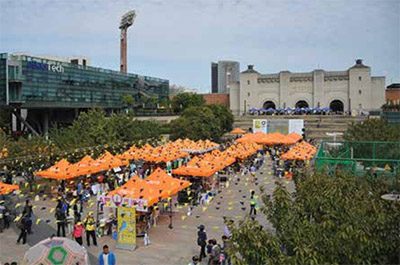
Shui On is said to have its KIC project in Shanghai on the block
Shui On Land’s earnings are not expected to bounce back this year, and the real estate developer remains troubled by balance sheet issues, despite selling landmark properties for more than $2.5 billion over the last two years.
According to a recent research note by investment bank DBS Vickers, while the Shanghai-based developer has seen an improvement in sales, it is still plagued with RMB 45.9 billion ($6.8 billion) in debt. Slow revenue bookings and higher interest expenses also continue to hurt the profitability of the developer of the iconic Xintiandi complex in Shanghai.
Contracted sales were up 410 percent during the first half of this year on a 269 percent increase in the amount of property sold. Despite this positive outlook for future earnings, however, Shui On was only able to deliver RMB 728 million in property sales in the period from January through June, a drop of 23 percent year on year. DBS Vickers expected that the Hong Kong-listed developer should beat its sales target for 2016, but reckons that the positive result will still do little to improve the condition of its balance sheet.
Burdened with debt, Shui On has sold a number of high profile properties in an attempt to alleviate some of its obligations, particularly as the value of the renminbi has slid seven percent against the dollar in the last year. DBS Vickers pointed out that the developer is trying to offload commercial properties, including the KIC project in Shanghai’s Yangpu district and if successful, this could inject some health into Shui On’s balance sheet.
Debts Persist Despite Asset Sales

Shui On Land chairman Vincent Lo has sold over RMB 16 bil in properties in the last two years
Shui On’s financial challenges continue despite the developer having sold more than RMB 16.7 billion in mature assets and development projects over the past two years. In July last year the developer sold the first phase of Corporate Avenue in Shanghai, to Hong Kong’s Link REIT for RMB 6.6 billion ($1.063 billion).
That sale was followed in December by Shui On offloading phase three of Corporate Avenue in Shanghai last year to a joint venture formed by oyster sauce maker Lee Kum Kee and Vanke. The JV purchased the project for RMB 5.7 billion ($885 million).
In 2014, Shui On had sold two hotels next to Xintiandi to Great Eagle, the developer run by the older brother of company chairman Vincent Lo, for RMB 2.7 billion.
This year the company parted with another of its prized assets, as the Lingnan Tiandi project in Foshan, Guangdong province, was sold to Country Garden for RMB 1.73 billion ($267 million). Shui On closed the deal with the top five mainland developer despite taking a record loss of RMB 90 million ($13.9 million) on the transaction.
Mainland Developers Continue to Carry High Levels of Debt
Shui On is not the only developer in China suffering from debt burdens, particularly as companies selling properties in renminbi struggle with rising costs of offshore debt denominated in US dollars. The real estate downturn in 2014 caused several developers, including Shui On, to accumulate a significant amount of debt as sales slowed down. Yuexiu Property was forced to sell 49 percent of a residential project in Guangzhou’s Baiyun district to Ping An-owned Guangzhou Lianheng Real Estate in order to service some of its $2.95 billion offshore debt.
Evergrande Real Estate remains China’s most indebted developer with RMB 297 billion ($45.8 billion) owed — which is 15 times its earnings before interest, taxes, depreciation and amortisation.
Unlike Shui On, the Guangzhou-based homebuilder has seen its stock continue to rise despite the its growing debt burden and has been among China’s most aggressive acquirers of new assets. This has caused some concern that Evergrande could default on its payments despite the developer saying it will have no issues covering its near term debt obligations.
Leave a Reply